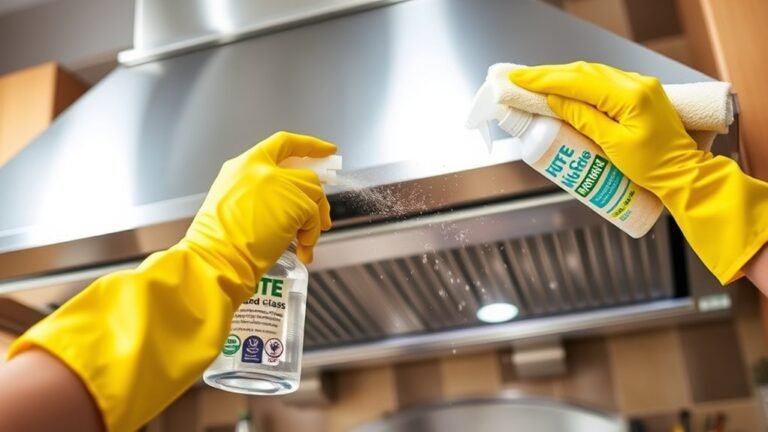Natural Alternatives to Washer
You can clean clothes without a washer by manually scrubbing with natural detergents like soap nuts, which contain saponin surfactants that break down dirt while preserving fabric integrity. Adding baking soda boosts stain removal and deodorizing, while white vinegar softens fabrics and neutralizes odors. Castile soap offers a gentle, eco-friendly alternative, especially when combined with washing soda for hard water. Using wool dryer balls and solar drying further enhances sustainable garment care. Exploring these methods reveals effective, eco-conscious laundry strategies.
Manual Hand Washing Techniques

Although manual hand washing may seem outdated compared to modern machines, it remains an effective method for cleaning clothes, especially when done correctly. When you engage in bucket bathing, you can optimize water use while ensuring thorough fabric cleansing. Applying targeted scrub techniques allows you to dislodge dirt particles embedded within fibers without damaging the material. By adjusting water temperature and agitation intensity, you control the mechanical action that breaks down soils and stains. This hands-on approach not only conserves energy but also offers you autonomy over detergent concentration and rinse cycles. Scientific studies confirm that manual washing with appropriate scrub methods achieves comparable cleanliness to machine washing for lightly to moderately soiled garments, making it a reliable, sustainable alternative aligned with your desire for freedom from conventional appliances. Incorporating natural cleaning agents like baking soda can enhance stain removal and deodorizing during manual washing.
Using Baking Soda for Laundry
One of the most versatile natural additives you can use for laundry is baking soda, scientifically known as sodium bicarbonate. Its alkaline pH of around 8.3 enhances water’s cleaning efficiency by neutralizing acidic odors and breaking down grease and grime. When you add baking soda to your wash, it improves detergent performance and softens fabrics without harsh chemicals. Studies confirm baking soda benefits include laundry whitening by gently lifting stains and preventing yellowing, especially in white fabrics. This process avoids fabric damage common with chlorine-based whiteners. You can dissolve about half a cup of baking soda directly into your wash water to optimize cleaning power and fabric brightness. Incorporating baking soda grants you chemical-free control over laundry quality, supporting your desire for freedom from conventional, synthetic laundering agents.
The Role of White Vinegar in Fabric Care

You can harness white vinegar’s acidic properties to neutralize odors in your laundry without harsh chemicals. Its ability to break down mineral deposits also helps soften fabrics efficiently during the wash cycle. Additionally, white vinegar acts as a mild stain remover by loosening residues, making it a safe option for fabric care.
Deodorizing Laundry Naturally
When tackling persistent odors in your laundry, white vinegar offers a scientifically supported solution by neutralizing alkaline odors and breaking down residues that trap smells in fabrics. Its acetic acid content disrupts odor-causing compounds, effectively deodorizing without harsh chemicals. To enhance this natural process and tailor scents to your preference, you can infuse white vinegar with essential oils or citrus peels prior to use. Essential oils provide antimicrobial properties and aromatic benefits, while citrus peels release natural oils that further break down odor molecules. This combination not only refreshes your fabrics but also empowers you to avoid synthetic fragrances, aligning with your desire for freedom from chemical dependence. Employing white vinegar with these natural additives presents a precise, evidence-based method for maintaining fresh laundry without compromising fabric integrity.
Softening Fabrics Effectively
Although fabric softeners are commonly used to enhance textile softness, white vinegar provides a scientifically validated alternative that modifies fabric fibers at a molecular level. When you add white vinegar during the rinse cycle, its acetic acid neutralizes alkaline residues left by detergents, which can stiffen fibers. This natural alternative promotes fabric softening without synthetic chemicals. Key mechanisms include:
- Breaking down mineral deposits that cause stiffness
- Restoring pH balance to fibers, improving pliability
- Reducing static cling by neutralizing electrical charges
Removing Stains Safely
Since stains can compromise both the appearance and integrity of fabrics, employing white vinegar offers a scientifically supported method to address them safely. Its mild acidity facilitates stain lifting by breaking down residues without harsh chemicals, promoting fabric preservation. When used correctly, white vinegar maintains textile fibers, extending garment lifespan and enhancing freedom from synthetic cleaners.
| Application Method | Effectiveness on Stains |
|---|---|
| Pre-soak (1:4 vinegar-water) | Moderate; loosens stains before wash |
| Direct spot treatment | High; targets localized stains |
| Added during rinse cycle | Enhances fabric softness, mild stain removal |
| Combined with baking soda | Synergistic effect; improved stain lifting |
You can confidently use white vinegar to remove stains safely while preserving fabric integrity and reducing reliance on conventional detergents.
Soap Nuts as a Natural Detergent

You’ll find that soap nuts contain saponin, a natural surfactant that effectively breaks down dirt and oils during washing. Studies show they provide comparable cleaning results to conventional detergents without synthetic chemicals. Plus, their biodegradable nature greatly reduces environmental impact compared to traditional laundry products.
Cleaning Power of Soap Nuts
When you consider natural detergents, soap nuts stand out due to their unique composition of saponins—natural surfactants that effectively break down dirt and oils. Their cleaning power derives from these compounds, which lower water’s surface tension and emulsify grime without synthetic chemicals. Understanding soap nut benefits and uses involves recognizing their capacity to:
- Remove organic stains by disrupting lipid and protein bonds,
- Maintain fiber integrity, reducing fabric wear over multiple washes,
- Adapt to various water temperatures, ensuring consistent cleaning performance.
This makes soap nuts a versatile choice for those seeking freedom from harsh detergents. Their efficiency isn’t just anecdotal; controlled studies confirm saponins’ biodegradability and antimicrobial properties, supporting soap nuts as a scientifically sound alternative for laundering needs. You’ll appreciate the balance between ecological responsibility and effective cleaning power soap nuts provide.
Environmental Benefits of Soap Nuts
Although many conventional detergents rely on synthetic chemicals that contribute to water pollution and ecosystem disruption, soap nuts offer an environmentally sustainable alternative due to their fully biodegradable nature and minimal processing requirements. When you choose soap nuts, you reduce environmental impact by eliminating phosphates, sulfates, and artificial fragrances commonly found in detergents. Their saponin content naturally decomposes without leaving harmful residues, preserving aquatic life and soil quality. Additionally, soap nuts require less energy and water during cultivation and processing compared to synthetic detergent production, further lowering carbon footprints. By using soap nuts, you support a closed-loop system that aligns with ecological balance, enabling you to maintain your laundry routine while minimizing pollution and resource depletion. This choice empowers you to exercise freedom through conscious, eco-friendly cleaning solutions.
Utilizing Castile Soap for Washing Clothes
One effective natural alternative to conventional laundry detergents is Castile soap, a vegetable-based soap known for its gentle cleansing properties and biodegradability. When you opt for Castile soap, you tap into castile soap benefits like reduced chemical exposure and environmental impact compared to synthetic detergents. As a versatile liquid soap alternative, it can be diluted for various washing needs without compromising fabric integrity.
Castile soap offers a gentle, eco-friendly alternative to traditional detergents, reducing chemical use while protecting fabrics and the environment.
To maximize its effectiveness, consider these technical aspects:
- Use 1-2 tablespoons of Castile soap per load to avoid residue buildup.
- Combine with washing soda to enhance cleaning performance in hard water.
- Adjust water temperature to optimize soap solubility and stain removal.
Benefits of Wool Dryer Balls
Using three to six wool dryer balls per load can greatly reduce drying time by improving air circulation and separating clothes more effectively. The natural resilience of wool fibers enhances laundry efficiency by absorbing moisture and generating friction that prevents static cling without chemicals. By choosing wool dryer balls, you gain freedom from synthetic alternatives, lower energy costs, and extend your dryer’s lifespan. For best results, be sure to use non-abrasive materials when cleaning your wool dryer balls to maintain their effectiveness over time.
| Benefit | Mechanism | Emotional Impact |
|---|---|---|
| Faster Drying | Enhanced air flow | Saves time |
| Reduced Static | Wool fiber texture | Less irritation |
| Eco-Friendly | Natural, biodegradable fibers | Peace of mind |
| Cost-Effective | Reusable, durable balls | Financial freedom |
These advantages make wool dryer balls a smart, sustainable choice for optimizing your laundry routine.
Solar-Powered Clothes Drying Methods
Beyond the benefits of wool dryer balls, harnessing natural energy sources can further enhance your laundry’s sustainability. Solar-powered clothes drying methods rely on sun drying and wind drying, leveraging ambient environmental conditions to reduce energy consumption. Sun drying uses direct solar radiation to evaporate moisture, while wind drying accelerates this by increasing airflow. You can optimize these methods by:
- Positioning laundry lines to maximize sun exposure and prevailing winds
- Utilizing reflective surfaces to increase heat absorption for faster drying
- Designing sheltered yet ventilated drying areas to protect clothes and maintain airflow
These techniques minimize your reliance on electric dryers, cutting both energy costs and carbon emissions. Embracing sun and wind drying grants you independence from grid-based power, aligning with eco-conscious living and your pursuit of freedom through sustainable, natural alternatives. Proper ventilation allows pollutants to escape, improving air quality during the drying process through natural airflow.
Eco-Friendly Laundry Bags and Tools
Although laundry bags and tools might seem like minor components in your routine, selecting eco-friendly options can greatly reduce microplastic pollution and energy use. By choosing reusable laundry bags made from natural fibers like organic cotton or hemp, you minimize synthetic fiber shedding during washes—an established source of microplastic contamination. Additionally, biodegradable laundry tools such as wooden scrubbing brushes or plant-based lint removers break down naturally, preventing landfill accumulation common with plastic alternatives. Studies show these eco-friendly materials maintain durability and cleaning efficiency comparable to conventional products, ensuring you won’t compromise on performance. Embracing these sustainable choices supports environmental freedom by reducing reliance on single-use plastics and lowering your carbon footprint, empowering you to make laundry routines that align with both ecological responsibility and personal autonomy. Proper washing and drying of reusable items is essential for maintaining their effectiveness and longevity, as explained in storage and longevity tips for reusable cleaning products.
Frequently Asked Questions
How Do Natural Laundry Methods Affect Water Usage Compared to Machines?
When you compare water conservation in natural laundry methods versus machines, you’ll find natural approaches often use less water overall. While machines optimize efficiency with cycles and spin speeds, hand washing or using washboards lets you control water volume precisely. This efficiency comparison shows natural methods can reduce water waste, especially if you reuse rinse water. So, if you value freedom and sustainability, adopting natural laundry techniques can greatly benefit your water conservation efforts.
Are Natural Detergents Safe for Sensitive Skin and Allergies?
Think of your skin as a delicate garden—natural detergents often act like gentle rain, minimizing harsh chemicals that can spark sensitivity levels and allergy triggers. Many contain biodegradable ingredients with fewer synthetic additives, reducing irritation risks. However, formulations vary, so you should review ingredient lists carefully. Patch testing is advisable to ascertain compatibility. This evidence-based approach lets you enjoy freedom from discomfort while protecting your skin’s unique needs.
Can Natural Alternatives Effectively Remove Tough Stains?
When you compare stain removal techniques, natural alternatives can be surprisingly effective, but their efficacy depends on the stain type and fabric. Enzyme-based natural detergents break down organic stains well, while baking soda or vinegar excel at lifting grease and odors. However, for tough, set-in stains, they might not match synthetic chemicals’ power. You’ll find that combining methods or pre-treating stains often improves results, giving you more freedom to choose gentler options confidently.
What Is the Environmental Impact of Natural Laundry Ingredients?
Beneath biodegradable blends, better benefits bloom. When you choose natural laundry ingredients, you greatly slash chemical runoff, reducing pollution in waterways. These eco-friendly elements break down swiftly, minimizing environmental burden compared to synthetic detergents loaded with harsh chemicals. Studies show they preserve aquatic ecosystems and promote soil health. By opting for these sustainable solutions, you embrace ecological freedom, lessening your footprint while maintaining effective cleaning power in your daily routine.
How Do Natural Washing Methods Affect Fabric Lifespan?
When you choose natural washing techniques, you often enhance fabric care by reducing exposure to harsh chemicals found in conventional detergents. Studies show these gentler methods cause less fiber breakdown, preserving fabric strength and color longer. You’ll find that natural ingredients, paired with appropriate washing techniques like lower temperatures and gentle agitation, minimize wear and tear, ultimately extending your textiles’ lifespan while granting you freedom from synthetic additives.






